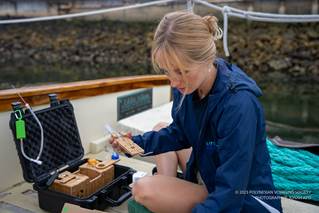Phytoplankton
About Plankton

Phytoplankton are tiny plants that float near the surface of the ocean. Even though they're small, they do big things for our planet. They make about half of the oxygen we breathe by using sunlight to make food in a process called photosynthesis. This makes them super important for keeping our air clean and balanced. Phytoplankton form the base of the marine food web, serving as primary producers that sustain entire marine ecosystems.
Phytoplankton are also great at absorbing carbon dioxide, a gas that can cause climate change, from the air. Scientists keep an eye on how many phytoplankton there are and where they're found because it tells us a lot about the health of the ocean.
If phytoplankton populations change, it can affect everything from fish to the weather. So, it's really important to make sure we protect and understand these tiny but mighty plants to keep our oceans and planet healthy.
Hōkūleʻa Sampling
Hōkūleʻa crew sampling for phytoplankton by a towing net and processing the sample through an onboard Planktoscope. The Planktoscope is a modular, open-source hardware and software instrument that is used for imaging plankton samples. Professor Kim Reece’s Marine & Aquaculture Molecular Genetics Lab will support efforts associated with Planktoscope sampling identification. Additionally, the Reece Lab will do targeted qPCR assays for harmful micro-algal species on extracted DNA from marine particles and microplastics.
Planktoscope Images of Samples
Phytoplankton Sampling Protocol

